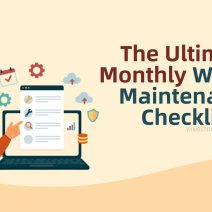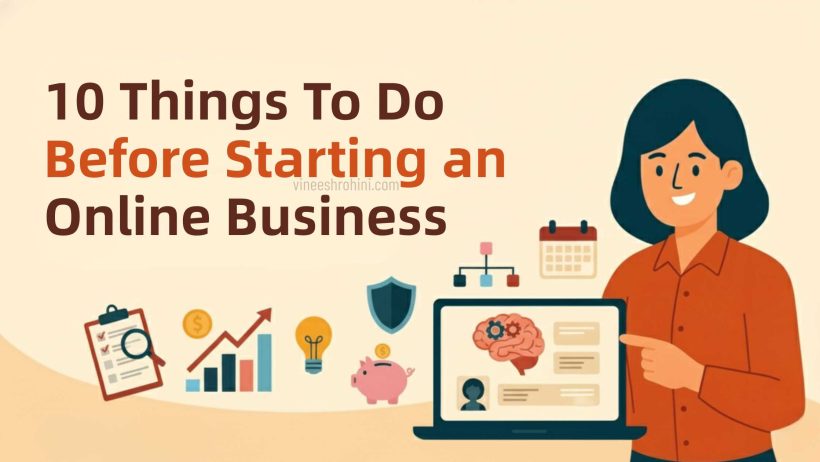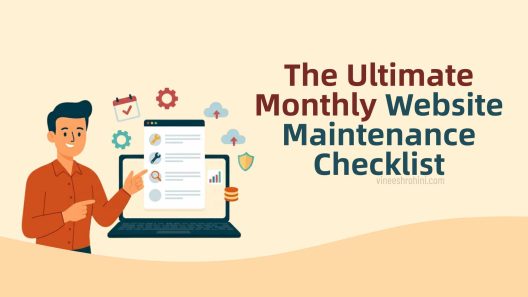Online Business : Starting an online business is one of the most exciting and rewarding ventures of the modern era. The digital economy is booming, and in 2025, more people than ever are turning their ideas into profitable online brands. Whether you want to sell physical products, digital services, or start a content-driven platform, an online business offers flexibility, low startup costs, and global reach. However, launching successfully requires more than just a good idea — it demands planning, research, structure, and strategy. Without proper preparation, many online ventures fail within the first year. To help you avoid that, this detailed professional guide outlines the 10 most important things to do before starting your online business.
Table of Contents
1. Identify a Profitable Niche

Every successful online business starts with a niche — a specific market segment with clear customer needs and opportunities. Choosing the right niche determines how easily you can attract and retain customers. It’s not about appealing to everyone; it’s about focusing on a target audience you can serve best.
Key steps to identify your niche:
- Find a problem to solve: Look for issues people face that you can address with your product or service.
- Use keyword research tools: G Trends, SEMrush, and Ahrefs reveal what people are searching for online.
- Evaluate demand and competition: Choose a niche with consistent demand but manageable competition.
- Leverage your passion and expertise: Building a business takes time and patience — choose something you care about.
Also Read : Where to Promote Online Business in 2025 : Comprehensive Guide
Examples of profitable niches in 2025:
- Sustainable lifestyle products (eco-friendly home essentials)
- Health and wellness (fitness coaching, supplements)
- Pet accessories (custom pet products)
- Digital education (courses, eBooks, mentorships)
- AI-based tools and automation services
Pro Tip: The most profitable niches combine personal interest + real demand + clear audience pain points.
2. Conduct Market Research
Once you have a niche idea, the next step is market research. It helps you understand your customers, competitors, and the viability of your business model. Research ensures you don’t launch a business blindly and allows you to make data-backed decisions.
How to conduct effective market research:
- Define your target audience: Identify who your ideal customers are — their age, gender, location, income, preferences, and buying behavior.
- Analyze competitors: Study similar businesses. What are they doing well? Where are they lacking? Tools like SimilarWeb and SpyFu help analyze competitors’ traffic, keywords, and strategies.
- Gather audience insights: Use online surveys, forums, and social media polls to understand what customers expect.
- Study industry trends: Stay updated with reports from Statista, HubSpot, or industry blogs.
Pro Tip: Validate your business idea by testing it. Create a simple landing page and run ads to see if people show interest before launching full-scale.
3. Define Your Business Model
Your business model defines how your company will operate, generate revenue, and scale. Online businesses have diverse structures, and choosing the right one ensures long-term sustainability.
Popular online business models:
- E-Commerce Store: Selling physical or digital products through platforms like Shopify or WooCommerce.
- Dropshipping: Selling without holding inventory — your supplier ships directly to customers.
- Affiliate Marketing: Promoting other companies’ products and earning commissions.
- Freelancing/Services: Offering skills like writing, web development, design, or marketing.
- Online Courses and Coaching: Monetizing expertise through learning platforms.
- Subscription Business: Providing value over time for a recurring fee (software, content, memberships).
Each model has pros and cons. For instance, eCommerce provides higher scalability but needs logistics; freelancing is low-cost but limited to your availability.
Pro Tip: Choose a model that matches your strengths, financial goals, and available resources.
4. Create a Business Plan

A well-structured business plan serves as your roadmap. It helps organize ideas, attract investors, and ensure you’re working toward clear goals.
Components of a solid business plan:
- Executive Summary: Overview of your business idea, mission, and goals.
- Market Analysis: Research insights, target audience, and competitors.
- Marketing Strategy: How you’ll attract and retain customers.
- Operations Plan: Business structure, staffing, logistics, and suppliers.
- Financial Plan: Startup costs, pricing strategy, revenue projections, and funding sources.
- Growth Plan: Long-term vision for scaling your business.
Pro Tip: Keep your business plan flexible. The online market changes rapidly — your plan should evolve with new data and trends.
5. Register Your Business and Handle Legal Formalities
Before selling online, make sure your business is legally registered and compliant with Indian and international eCommerce laws (if applicable). Legal structure impacts taxes, funding, and liability.
Steps to register your online business in India:
- Choose your business structure: Options include Sole Proprietorship, LLP, or Private Limited Company.
- Register your business name: Make it unique, easy to spell, and relevant to your brand.
- Apply for a GST number: Mandatory for online sellers who cross revenue thresholds or deal with interstate transactions.
- Obtain a PAN and business bank account: Keep personal and business finances separate.
- Trademark your brand name and logo: Protects your intellectual property.
- Set up website compliance policies: Include privacy policy, refund policy, and terms of service pages.
Pro Tip: Consulting a business registration expert or CA saves time and prevents legal issues later.
6. Build Your Online Presence (Website and Branding)
Your online presence is your identity in the digital marketplace. A professional website and strong branding give customers confidence in your business.
Steps to build a professional online presence:
- Domain and Hosting: Choose a domain name that matches your brand. Buy hosting from trusted providers like Hostinger, Bluehost, or SiteGround.
- Website Development: Use Shopify for eCommerce, WordPress for blogs or services, or Wix for simple sites.
- Brand Design: Create a logo, brand colors, and typography for visual consistency.
- Website Essentials: Include About, Contact, Product/Service, and Policy pages.
- Mobile Optimization: Ensure your site loads fast and functions perfectly on smartphones.
Pro Tip: Keep your website SEO-friendly with optimized keywords, image compression, and responsive design.
7. Set Up Payment, Fulfillment, and Security Systems
Payment and delivery form the backbone of customer satisfaction. A reliable and secure system ensures smooth transactions and trust.
For Payments:
- Integrate gateways like Razorpay, PayU, or Instamojo to accept UPI, cards, and wallets.
- Offer multiple payment methods — including EMI and COD (for physical products).
- Use SSL certificates for website encryption and security.
For Order Fulfillment:
- Partner with logistics providers like Shiprocket, Delhivery, or Bluedart.
- Use automation tools for real-time tracking and notifications.
- Set up a clear return/refund policy.
For Digital Services:
- Use platforms like PayPal, Stripe, or Wise for international transactions.
Pro Tip: Customers trust businesses with visible payment security badges and transparent shipping policies.
8. Develop a Marketing and Sales Strategy

A great product without visibility won’t succeed. Marketing connects your brand with the right audience, while sales strategies convert visitors into buyers.
Core digital marketing methods:
- Search Engine Optimization (SEO): Helps your website rank higher organically on G.
- Social Media Marketing: Build brand awareness through platforms like Insta, FB, LinkedIn, and YT.
- Email Marketing: Use platforms like Mailchimp or ConvertKit to engage and nurture leads.
- Paid Advertising (PPC): Run targeted ads on G or Meta Ads for quick visibility.
- Influencer Marketing: Collaborate with influencers who align with your brand.
- Content Marketing: Publish blogs, tutorials, and videos to attract and educate your audience.
- Affiliate Programs: Allow others to promote your business for a commission.
Pro Tip: Focus on storytelling and value-based marketing. People buy from brands they trust — not just those who sell.
Buy Now : Ready Made Digital Store with 100 Products
9. Set Up Analytics and Performance Tracking
To grow, you must measure. Analytics tools help track visitor behavior, marketing effectiveness, and financial performance.
Essential analytics tools for your business:
- G Analytics 4 (GA4): Tracks website traffic, demographics, and user actions.
- G Search Console: Monitors keyword rankings and website health.
- FB Pixel and G Tag Manager: Measure ad performance and audience engagement.
- Hotjar or Microsoft Clarity: Visualize user behavior through heatmaps and recordings.
- CRM Tools: Use Zoho CRM, HubSpot, or Salesforce to track leads and sales performance.
Metrics to focus on:
- Traffic sources (organic, paid, referral)
- Conversion rates
- Average order value
- Customer acquisition cost (CAC)
- Return on investment (ROI)
Pro Tip: Data-driven decisions lead to faster growth. Review analytics weekly and adjust your strategy accordingly.
10. Prepare for Launch and Plan for Scalability
Once everything is in place, it’s time to launch — but do it strategically. A well-planned launch helps you create buzz, attract customers, and gain valuable feedback.
Pre-launch checklist:
- Test your website on multiple devices.
- Run a soft launch with select users or influencers.
- Fix technical issues and optimize site speed.
- Finalize your ad campaigns and email funnels.
- Announce your launch on social media and through press releases.
Post-launch actions:
- Collect feedback to identify improvements.
- Offer limited-time discounts or free trials to attract early adopters.
- Start building long-term customer relationships through loyalty programs and content engagement.
- Automate operations gradually using CRM and marketing tools.
Pro Tip: Scaling too fast without systems in place can hurt your brand. Grow steadily, reinvest profits, and refine operations continuously.
Conclusion

Starting an online business is more than setting up a website — it’s about building a digital ecosystem that delivers value, trust, and convenience to your audience. By following these ten steps — from identifying your niche and conducting research to setting up analytics and planning your launch — you’ll have a strong foundation for success. The digital market in 2025 is dynamic, but it rewards those who plan carefully, adapt quickly, and deliver quality consistently.
Buy Now : Ready Made Digital Store with 100 Products
Building an online business requires vision, patience, and constant learning. Every decision you make before launching — from branding to marketing — shapes your success. If you invest time in preparation now, you’ll save yourself years of struggle later.
The key is simple: Plan well. Execute smartly. Grow sustainably.
Disclaimer : This article is for informational and educational purposes only. It should not be considered business, financial, or legal advice. Readers are encouraged to conduct their own research or seek professional guidance before starting an online business.







